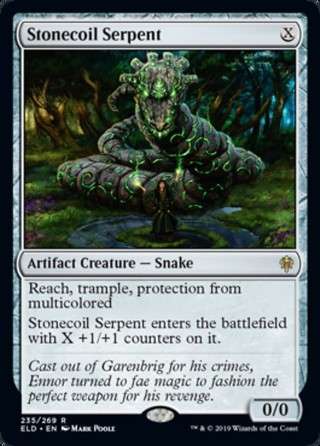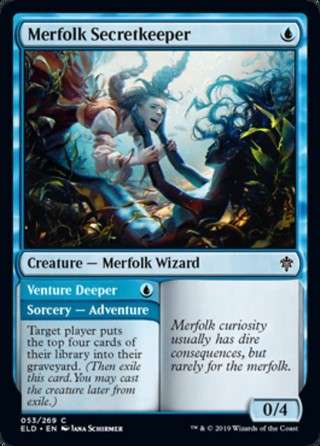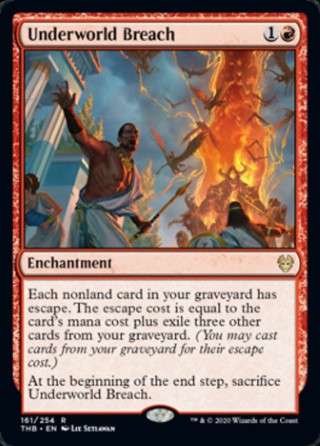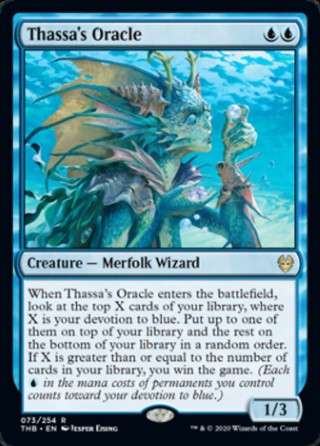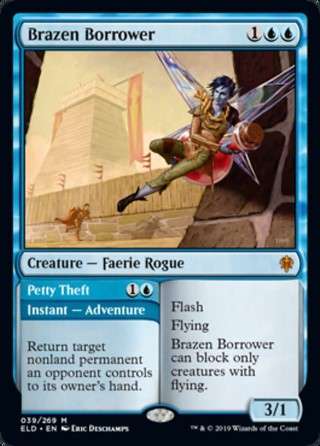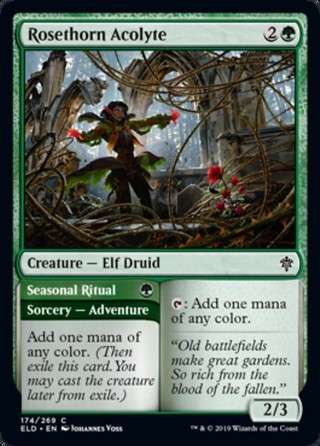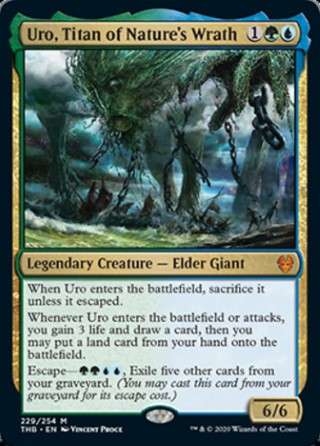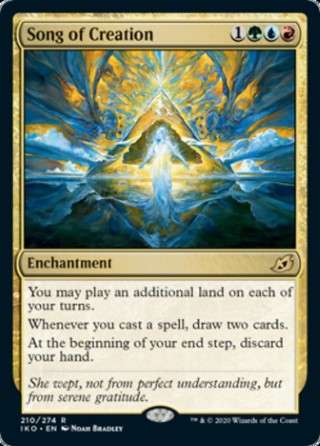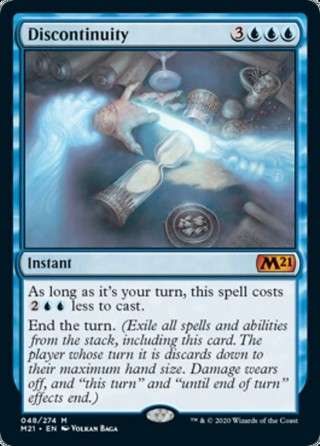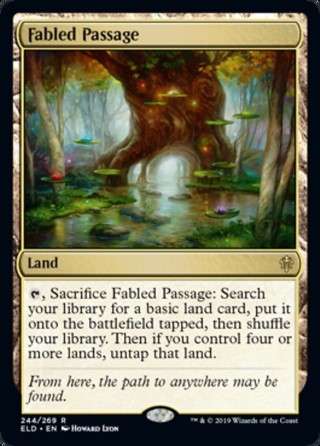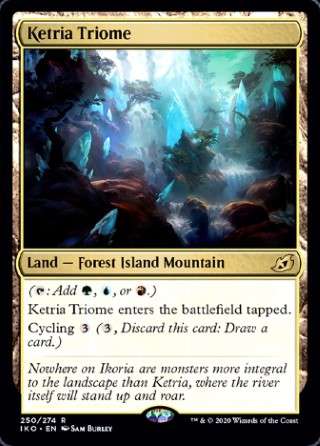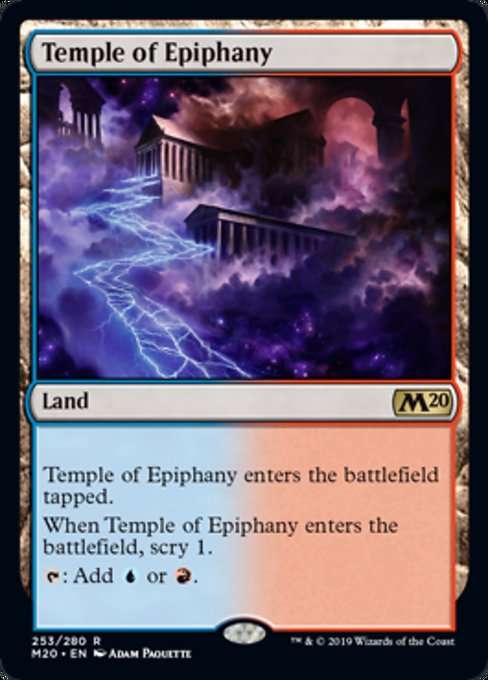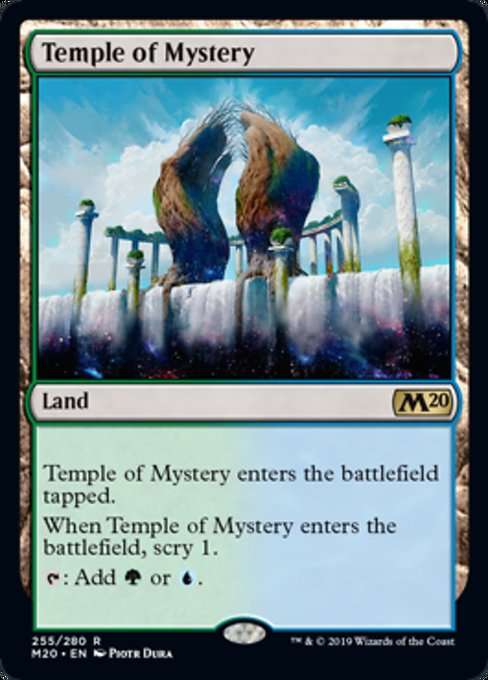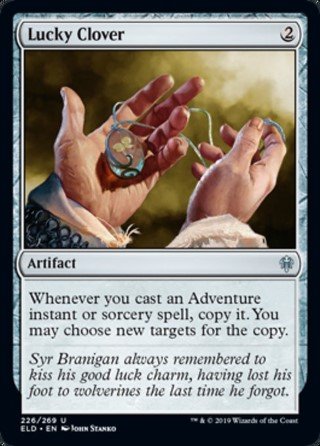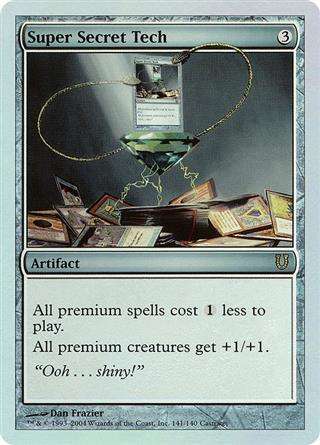Arena Standard - Temur Song Decking
- Deck contains 14 invalid cards for this format: Underworld Breach (THB), Discontinuity (M21), Brazen Borrower (ELD), Fabled Passage (ELD), Temple of Mystery (M20), Temple of Epiphany (M20), Ketria Triome (IKO), Stonecoil Serpent (ELD), Thassa's Oracle (THB), Rosethorn Acolyte (ELD), Song of Creation (IKO), Uro, Titan of Nature's Wrath (THB), Merfolk Secretkeeper (ELD), Unsummon (M20)
Main 60 cards (17 distinct)
| Instant, Sorcery, Enchantment, Artifact (11) | |||
|---|---|---|---|
| $11.22€9.340.64 | |||
| $1.16€1.980.10 | |||
| $0.70€0.390.22 | |||
|
3
Unsummon
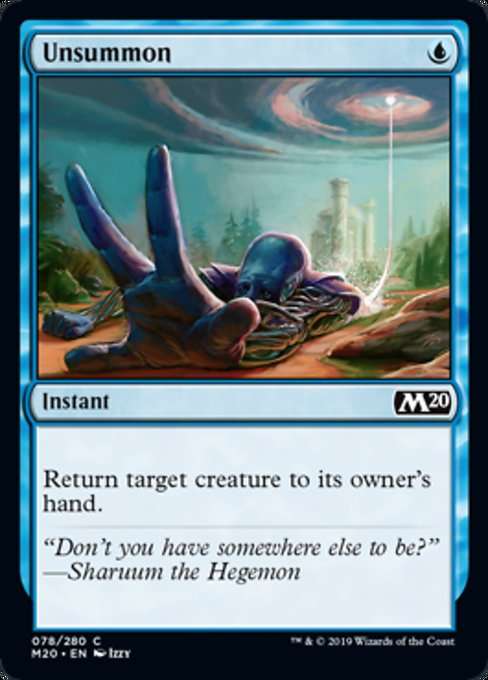
|
$0.20€0.100.03 | ||
| Creature (23) | |||
| $4.018.86 | |||
| $0.98€0.650.02 | |||
| $18.67€14.162.09 | |||
| $0.180.03 | |||
| $4.09€5.660.87 | |||
| $0.200.03 | |||
| Land (26) | |||
|
1
Mountain
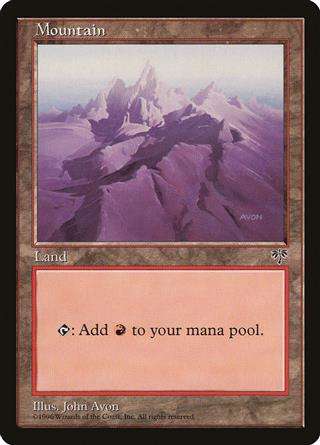
|
$0.500.04 | ||
| $5.91€4.100.15 | |||
| $0.38€0.170.02 | |||
| $0.44€0.230.02 | |||
| $14.00€11.551.02 | |||
|
6
Island
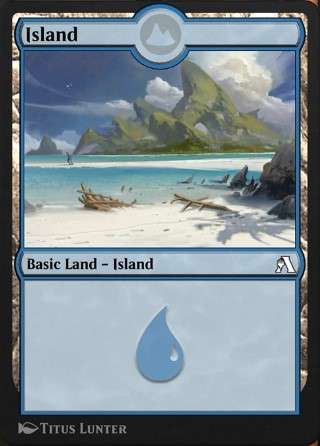
|
|||
|
3
Forest
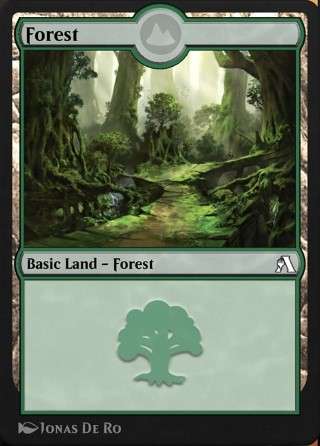
|
|||
(Simplified, true algorithm in MTGA not revealed by Wizards yet)
COMPARE WITH AETHERHUB COLLECTION
Add at least 100 different cards to your collection and set it as your Compare Collection on the manage page to see what cards from this deck you are missing.
COMPARE WITH MTG ARENA COLLECTION
Compare your MTG Arena Collection with AetherHub decklists or any other decks found on the web with the MTGA Assistant extension. Syncing your account will automatically upload your collection so you can see what cards you are missing right here.
Learn more Download For Windows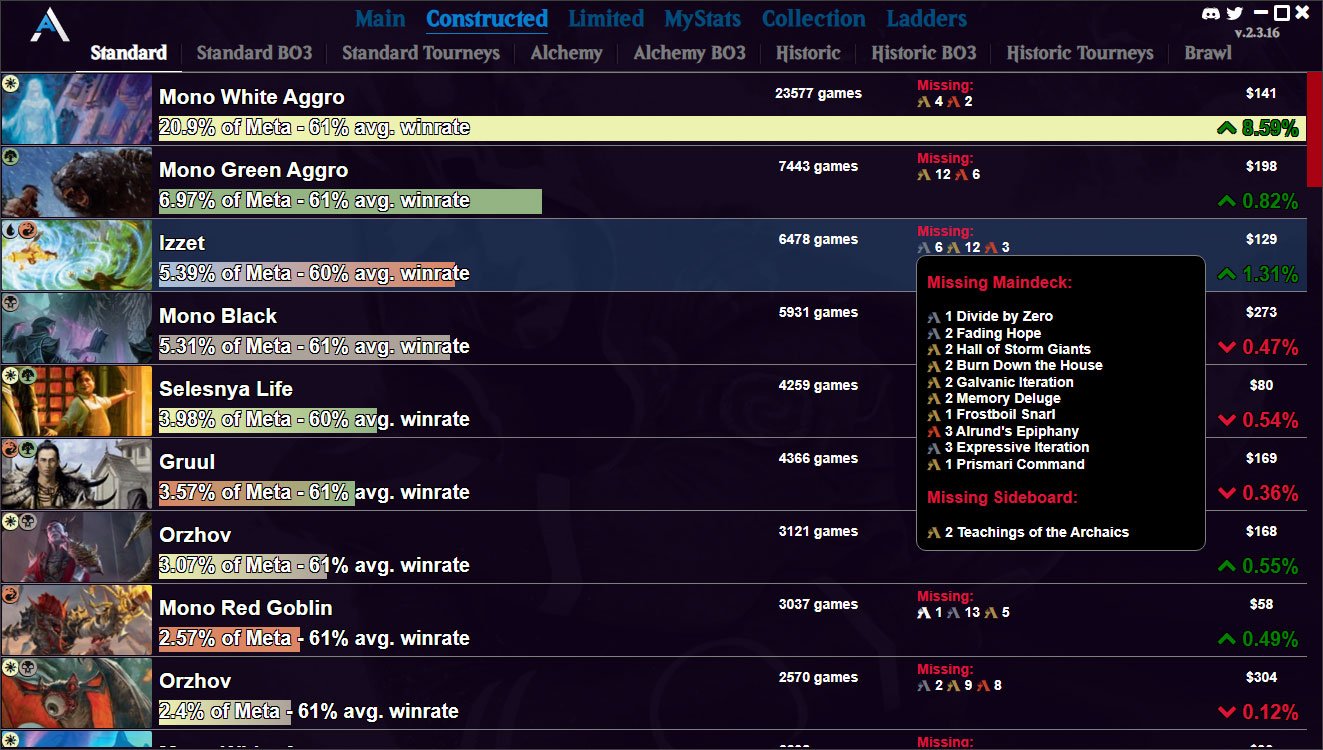
This deck's main win condition is to draw or mill through the entire deck and win by playing a Thassa's Oracle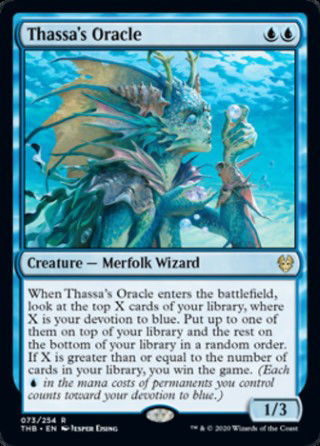 .
.
Unlike many other kinds of Song decks, this deck is flexible and resilent, presenting the player with many options to respond to what's happening on the board. It's a tempo-leaning combo deck that ramps and plays more spells than your opponent can keep up with, disrupts the opponent's board, and can play viable threats which can go face in the case that you can't play the main combo.
Main Combo
The main combo of the deck is Song of Creation + cheap spells, for example Stonecoil Serpent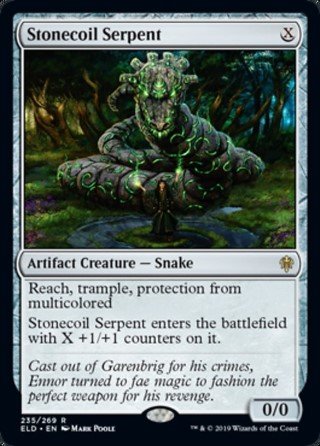 which can be played for {0}; Seasonal Ritual
which can be played for {0}; Seasonal Ritual which is mana-neutral in effect costing {0}; Venture Deeper
which is mana-neutral in effect costing {0}; Venture Deeper which becomes a {1} mana draw 2 and mill 4; and Unsummon
which becomes a {1} mana draw 2 and mill 4; and Unsummon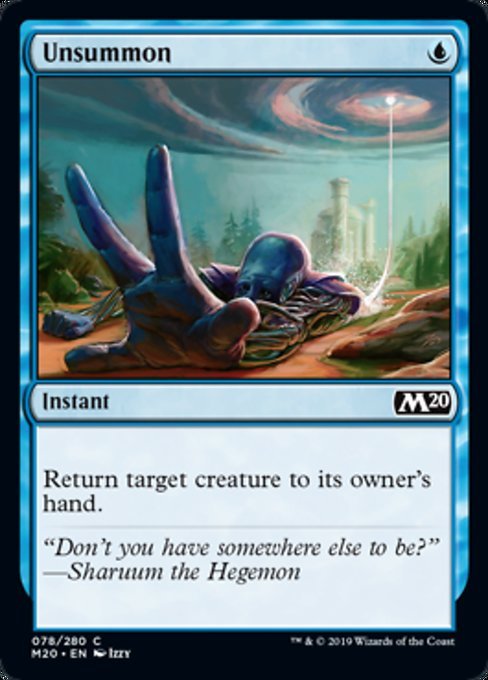 which becomes a {1} mana draw 2 and bounce-a-thing.
which becomes a {1} mana draw 2 and bounce-a-thing.
The biggest limitation we're trying to play around is having to discard our hand. We get around this by playing cards from zones outside our hand, such as Uro, Titan of Nature's Wrath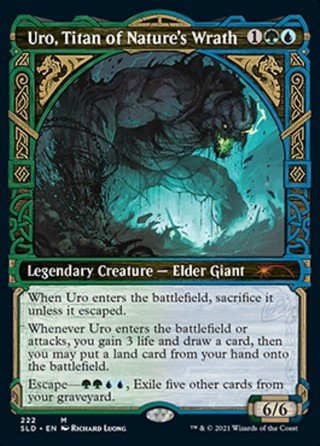 or our adventure spells. We can cast cheap adventure spells to draw cards with Song or to control the board a bit, and then the creature enters the adventure zone where it won't be discarded at the end of our turn.
or our adventure spells. We can cast cheap adventure spells to draw cards with Song or to control the board a bit, and then the creature enters the adventure zone where it won't be discarded at the end of our turn.
We can also avoid the discard trigger altogether by prematurely ending our own turn with Discontinuity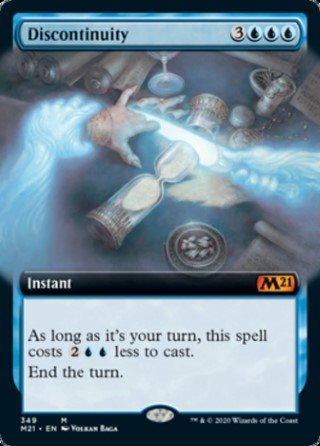 .
.
Timing is critical once we are ready to win - we need to have a way to cast one of our 4 Thassa's Oracle in the small window in which it will win us the game without decking ourselves and losing the game. Because we discard our hand at the end of every turn we can't simply hold an Oracle in hand until we need it. To give ourselves more outs during this fleeting window, we play 4x Underworld Breach
in the small window in which it will win us the game without decking ourselves and losing the game. Because we discard our hand at the end of every turn we can't simply hold an Oracle in hand until we need it. To give ourselves more outs during this fleeting window, we play 4x Underworld Breach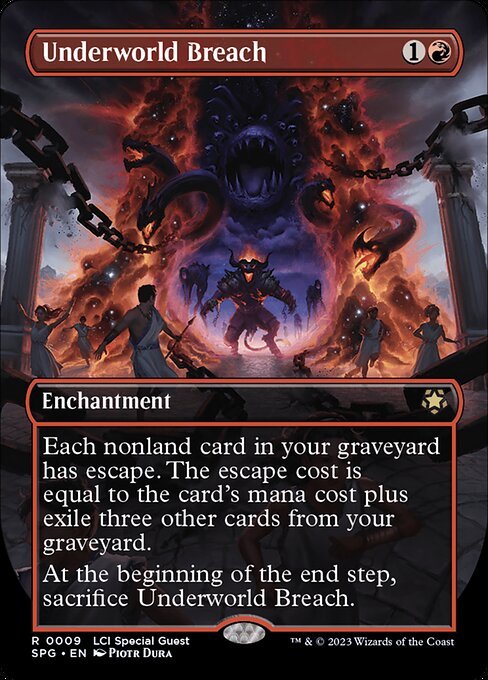 which can cast an Oracle from the graveyard to win the game if necessary.
which can cast an Oracle from the graveyard to win the game if necessary.
Micro Combos
Discontinuity can be played after an Uro, Titan of Nature's Wrath
can be played after an Uro, Titan of Nature's Wrath which was cast from the hand in order to avoid the sacrifice trigger and keep it on the board. This is mainly useful in situations where you haven't been able to create a good graveyard. Discontinuity can also do the same to the sacrifice trigger on Underworld Breach
which was cast from the hand in order to avoid the sacrifice trigger and keep it on the board. This is mainly useful in situations where you haven't been able to create a good graveyard. Discontinuity can also do the same to the sacrifice trigger on Underworld Breach , keeping it around during your opponent's turn to disrupt their board with cards from your graveyard and draw you more cards for when you untap next turn.
, keeping it around during your opponent's turn to disrupt their board with cards from your graveyard and draw you more cards for when you untap next turn.
Underworld Breach can be used to cheat out an Uro by reducing its Escape cost to {1}{G}{U} and exile 3 rather than it's normal {G}{G}{U}{U} exile 5. This is mainly useful in reducing the exile cost.
can be used to cheat out an Uro by reducing its Escape cost to {1}{G}{U} and exile 3 rather than it's normal {G}{G}{U}{U} exile 5. This is mainly useful in reducing the exile cost.
Underworld Breach combos off with Stonecoil Serpent
combos off with Stonecoil Serpent allowing you to draw pretty much as many cards as you have in the graveyard when Song is down. You play the Serpent for {0}, killing it and send it to the bin where you can then Escape it with Breach for {0} and exile three cards from the yard, over and over again. It's not an infinite combo since it does consume your graveyard without refilling it, but it doesn't have to be infinte to be hugely powerful in closing the game or finding us the cards we need in that moment to survive another turn.
allowing you to draw pretty much as many cards as you have in the graveyard when Song is down. You play the Serpent for {0}, killing it and send it to the bin where you can then Escape it with Breach for {0} and exile three cards from the yard, over and over again. It's not an infinite combo since it does consume your graveyard without refilling it, but it doesn't have to be infinte to be hugely powerful in closing the game or finding us the cards we need in that moment to survive another turn.
Unsummon is hugely powerful in the deck as a tempo card which also can draw us 2 when Song is down. It combos off nicely with Merfolk Secretkeeper
is hugely powerful in the deck as a tempo card which also can draw us 2 when Song is down. It combos off nicely with Merfolk Secretkeeper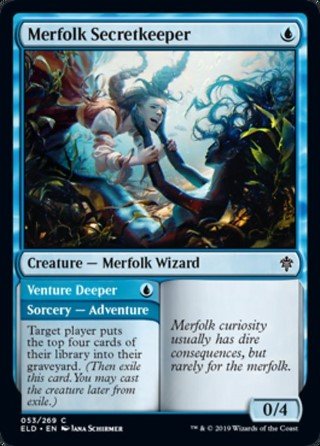 by drawing us 2 cards and also putting Secretkeeper back in the hand for essentially two additional {1} mana spells to act as additional Song triggers.
by drawing us 2 cards and also putting Secretkeeper back in the hand for essentially two additional {1} mana spells to act as additional Song triggers.
Merfolk Secretkeeper fills the bin for an early Uro escape (it can also find Uro); it fills the bin for Underworld Breach
fills the bin for an early Uro escape (it can also find Uro); it fills the bin for Underworld Breach ; it helps us play toward our win condition of self-mill; and it puts a creature in the adventure zone where it is protected from the discard of Song of Creation
; it helps us play toward our win condition of self-mill; and it puts a creature in the adventure zone where it is protected from the discard of Song of Creation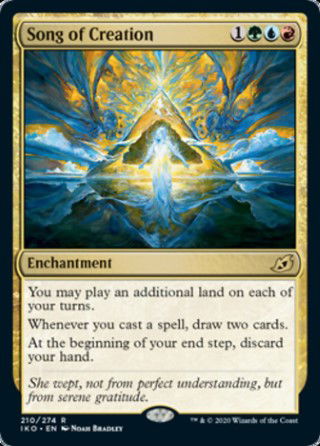 .
.
Alternative Win Condition
It is very viable in this deck to win just by going face. This deck has a lot of ramp in it allowing you to play large Stonecoil Serpents and it is incredibly common to be able to recurse Uro, Titan of Nature's Wrath every turn, even if he keeps getting removed. Brazen Borrower
every turn, even if he keeps getting removed. Brazen Borrower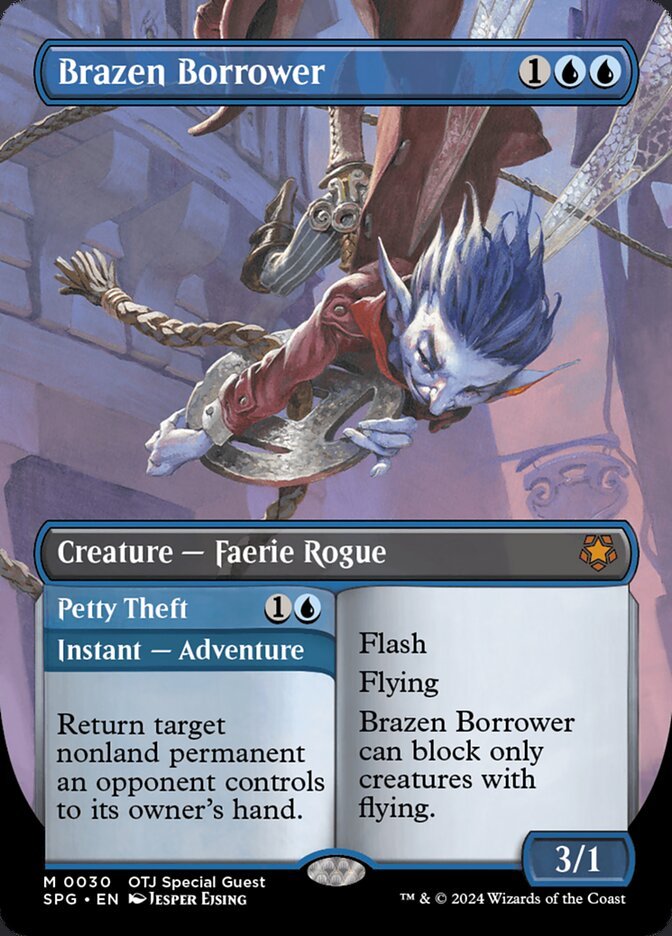 can also help to threaten your opponent's life total as a 3 power evasize threat.
can also help to threaten your opponent's life total as a 3 power evasize threat.
If these cards aren't being played to go face, they can still be played as viable threats that can force your opponent to respond to them, drawing their resources away from disrupting your main combo.
Don't play Opt
I've seen other lists run Opt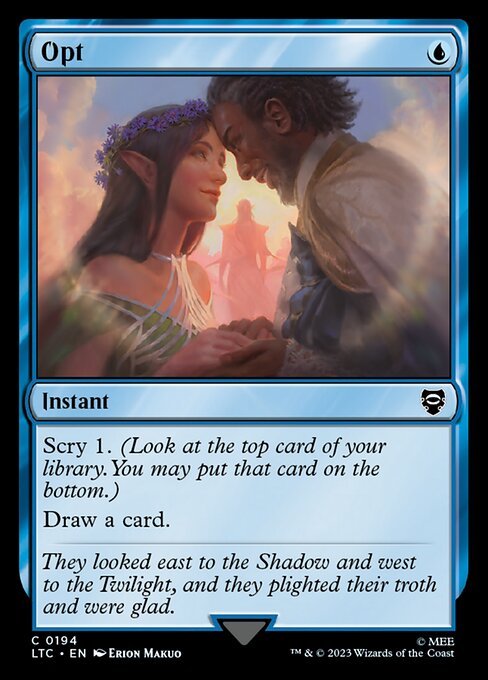 . Here's why we're not:
. Here's why we're not:
Opt becomes a {1} mana draw 3 scry 1 with Song of Creation
becomes a {1} mana draw 3 scry 1 with Song of Creation on the board. On first conisderation it seems like an obvious choice for the deck - it helps us get a bit deeper. However, ALL of your cards become draw 2 when Song is down, so why not play a card which also can interact with the board or give you some other advantage. Take Unsummon
on the board. On first conisderation it seems like an obvious choice for the deck - it helps us get a bit deeper. However, ALL of your cards become draw 2 when Song is down, so why not play a card which also can interact with the board or give you some other advantage. Take Unsummon , for example, which is a straight up better card than Opt
, for example, which is a straight up better card than Opt in the deck. Ignoring for a second that Unsummon
in the deck. Ignoring for a second that Unsummon probably has greater value for us than Opt
probably has greater value for us than Opt in the early game before we have played Song of Creation, consider what the Opt
in the early game before we have played Song of Creation, consider what the Opt is trying to do in the deck after Song has come down: When you play an Opt
is trying to do in the deck after Song has come down: When you play an Opt , what are you looking for in those next 3 cards that go in your hand? Most of the time the answer is more cheap spells to draw you additional cards and get deeper. Now consider Unsummon
, what are you looking for in those next 3 cards that go in your hand? Most of the time the answer is more cheap spells to draw you additional cards and get deeper. Now consider Unsummon : If you aren't using it to interact with your opponent's board, you can choose to unsummon your own Merfolk Secretkeeper
: If you aren't using it to interact with your opponent's board, you can choose to unsummon your own Merfolk Secretkeeper or Stonecoil Serpent
or Stonecoil Serpent . If you have bounced your Secretkeeper, you now have essentially gained 4 cards of advantage over Opt's 3 - AND you have gauranteed that 2 of those 4 cards are cheap spells which will draw you more cards with Song. In the case of Stonecoil Serpent
. If you have bounced your Secretkeeper, you now have essentially gained 4 cards of advantage over Opt's 3 - AND you have gauranteed that 2 of those 4 cards are cheap spells which will draw you more cards with Song. In the case of Stonecoil Serpent you can replay it for {0}, turning Unsummon into a {1} mana draw 4 over Opt's draw 3. The same can also be true for bouncing a Rosethorn Acolyte
you can replay it for {0}, turning Unsummon into a {1} mana draw 4 over Opt's draw 3. The same can also be true for bouncing a Rosethorn Acolyte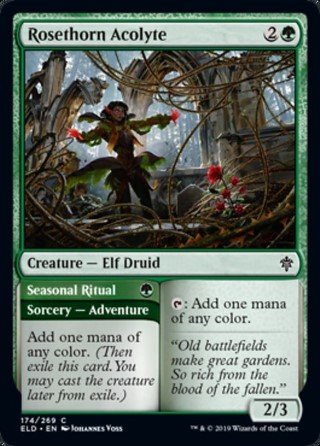 which, like Stonecoil Serpent, turns Unsummon into a {1} mana draw 4. If you don't have any of these targets for unsummon, you can probably play a Merfolk Secretkeeper
which, like Stonecoil Serpent, turns Unsummon into a {1} mana draw 4. If you don't have any of these targets for unsummon, you can probably play a Merfolk Secretkeeper from the adventure zone first. If that's still not true, you probably have a good target on your opponent's board that still gains you a bit of tempo + 2 cards.
from the adventure zone first. If that's still not true, you probably have a good target on your opponent's board that still gains you a bit of tempo + 2 cards.
Every other card in our deck is more flexible than Opt - filling multiple roles in the deck and giving us a lot more Options than the titular card - and sometimes even giving you better card advantage. In my humble opinion, you don't really need more card advantage cards in a deck that is built around Song of Creation .
.
Rotation Proof
I built this deck for Arena's "Standard 2021" competitive queue, so all cards will still be in rotation after Zendikar Rising is released. I will revisit this deck after the new set comes out and build out a sideboard for best-of-three, but please let me know if you have any feedback, questions, suggestions or thoughts about a potential sideboard.
Maybe-Board: Rielle, The Everwise
Rielle is a natural card to consider in place of Discontinuity . It does pretty much the same thing as Discontinuity - ensuring that we untap with a hand of cards to play on our next turn, and/or allowing us to play instant-speed interaction on our opponent's turn despite having a Song of Creation
. It does pretty much the same thing as Discontinuity - ensuring that we untap with a hand of cards to play on our next turn, and/or allowing us to play instant-speed interaction on our opponent's turn despite having a Song of Creation on the board. Many Song of Creation/self-mill decks in standard right now utilize her, and for good reason. I'm experimenting with the card and it may end up going in post-rotation.
on the board. Many Song of Creation/self-mill decks in standard right now utilize her, and for good reason. I'm experimenting with the card and it may end up going in post-rotation.
Rielle gets us much deeper in the deck, drawing as many cards as we discard. It's also a permanent, so unlike Discontinuity we threaten to pull the same trick next turn if our opponent doesn't deal with her in some way. In a "cheerios" style deck which seeks to play a bunch more {0} mana spells for free card draw (and which can try to win the turn that Song is played) Rielle is much more appropriate. But here's why we're not playing with her:
Our deck seeks to be more flexible and to provide viable threats without Song of Creation . Discontinuity makes our deck much more resilient to disruption since it does not absolutely rely on the main combo. Rielle doesn't do anything in the deck without a Song, so she is a "win-more" card. In this particular deck, she also is unlikely to have a meaningful impact on how quickly you can close the game. Typically this deck wins two turns after playing down Song if you're winning via the main combo. I haven't seen my clock change in my play testing with her so far. Perhaps if I played more free spells that would be true, but again, my goal is to create a more resillient combo which is why we're not going full "cheerios".
. Discontinuity makes our deck much more resilient to disruption since it does not absolutely rely on the main combo. Rielle doesn't do anything in the deck without a Song, so she is a "win-more" card. In this particular deck, she also is unlikely to have a meaningful impact on how quickly you can close the game. Typically this deck wins two turns after playing down Song if you're winning via the main combo. I haven't seen my clock change in my play testing with her so far. Perhaps if I played more free spells that would be true, but again, my goal is to create a more resillient combo which is why we're not going full "cheerios".
Rielle, the Everwise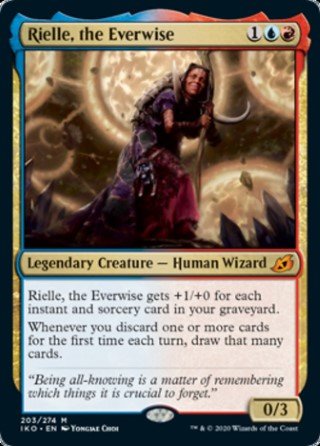 is more expensive than Discontinuity
is more expensive than Discontinuity . One mana is not a ton, but it can be the difference between being able to play additional board interaction such as Unsummon
. One mana is not a ton, but it can be the difference between being able to play additional board interaction such as Unsummon to mess with our opponent's tempo, or a 1 mana chumper such as Merfolk Secretkeeper
to mess with our opponent's tempo, or a 1 mana chumper such as Merfolk Secretkeeper or Stonecoil Serpent
or Stonecoil Serpent . 1 mana can be the difference between being able to cast her from the graveyard after spending the mana to find and play down an Underworld Breach
. 1 mana can be the difference between being able to cast her from the graveyard after spending the mana to find and play down an Underworld Breach . 1 mana can really make a difference in this deck.
. 1 mana can really make a difference in this deck.
Rielle plays a limited role in the deck: she helps us get deeper (in a deck that is already designed to go deep without her), and she helps to fill our hand for the following turn. Discontinuity , however, has other interaction in the deck with Underworld Breach
, however, has other interaction in the deck with Underworld Breach or Uro, Titan of Nature's Wrath
or Uro, Titan of Nature's Wrath , and can also sometimes be used as a counterspell when an opponent plays interaction on your turn you wish to prevent - or even could be used to make your opponent skip their turn in certain niche situations.
, and can also sometimes be used as a counterspell when an opponent plays interaction on your turn you wish to prevent - or even could be used to make your opponent skip their turn in certain niche situations.
Finally, we're more likely to get Disontinuity to do its thing than Rielle, the Everwise , since Rielle is a creature opening her up to instant speed removal on the turn we play her. This can be absolutely catastrophic for us since an important use of Discontinuity is to be able to keep a card in your hand, like a Thassa's Oracle
, since Rielle is a creature opening her up to instant speed removal on the turn we play her. This can be absolutely catastrophic for us since an important use of Discontinuity is to be able to keep a card in your hand, like a Thassa's Oracle , so you don't miss your window for victory. In contrast, even if she does stick on the board Rielle only makes our win condition that much more volatile since it becomes even easier to accidentally draw ourselves down before we can play our Thassa's Oracle
, so you don't miss your window for victory. In contrast, even if she does stick on the board Rielle only makes our win condition that much more volatile since it becomes even easier to accidentally draw ourselves down before we can play our Thassa's Oracle . In decks which run Rielle, I notice they typically run 6 win con cards in addition to the Underworld Breach: typically either 4x Jace, Wielder of Mysteries
. In decks which run Rielle, I notice they typically run 6 win con cards in addition to the Underworld Breach: typically either 4x Jace, Wielder of Mysteries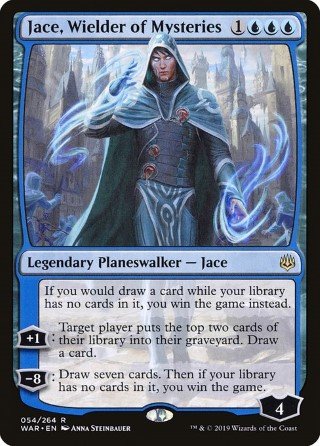 and 2x Thassa's Oracle
and 2x Thassa's Oracle or the reverse. This Jace win condition helps to counteract this exact problem with Rielle. So it's not as simple as subbing out a Discontinuity for a Rielle. We also need to sub out 2 other cards so we can add 2 additional win-con cards. Jace only serves to make our deck more narrow since he is pretty much a dead card in the deck until we're ready to win, as opposed to Thassa's Oracle
or the reverse. This Jace win condition helps to counteract this exact problem with Rielle. So it's not as simple as subbing out a Discontinuity for a Rielle. We also need to sub out 2 other cards so we can add 2 additional win-con cards. Jace only serves to make our deck more narrow since he is pretty much a dead card in the deck until we're ready to win, as opposed to Thassa's Oracle which is very good to play early game to help us fix our hand and act as an important blocker.
which is very good to play early game to help us fix our hand and act as an important blocker.
TL;DR: Rielle is more narrow than Discontinuity , more prone to disruption, and makes our win condition window dangerously small.
, more prone to disruption, and makes our win condition window dangerously small.
Maybe-Board: Lucky Clover
Clover has excellent interaction with our already high number of adventure cards, allowing us to duplicate their effect. This means that Petty Theft can allow us to bounce 2 permanents; Venture Deeper
can allow us to bounce 2 permanents; Venture Deeper mills us 8 cards; and Seasonal Ritual
mills us 8 cards; and Seasonal Ritual now actually ADDS an additional mana. The reason I'm not playing Clover just yet is because it doesn't do anything when you play it. In an already combo-focused deck, this is bad news, especially when we have Song down. If it were {1} mana we would be playing it for sure, but {2} mana makes us at least stop to consider whether or not a do-nothing spell can be played in this kind of deck.
now actually ADDS an additional mana. The reason I'm not playing Clover just yet is because it doesn't do anything when you play it. In an already combo-focused deck, this is bad news, especially when we have Song down. If it were {1} mana we would be playing it for sure, but {2} mana makes us at least stop to consider whether or not a do-nothing spell can be played in this kind of deck.
If I did play Clover, it might be in the sideboard as a two-of against decks where doubling the Petty Theft becomes more relevant and where we can afford to play a turn 2 do-nothing spell (such as against control), and I might also consider other adventure cards. Stomp
becomes more relevant and where we can afford to play a turn 2 do-nothing spell (such as against control), and I might also consider other adventure cards. Stomp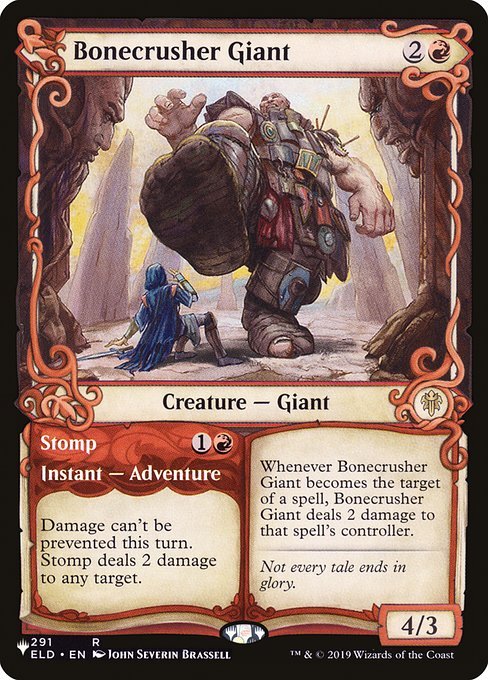 might be added to the sideboard since it would now allows us to kill things with 3 or 4 toughness, or kill some planeswalkers. Haggle
might be added to the sideboard since it would now allows us to kill things with 3 or 4 toughness, or kill some planeswalkers. Haggle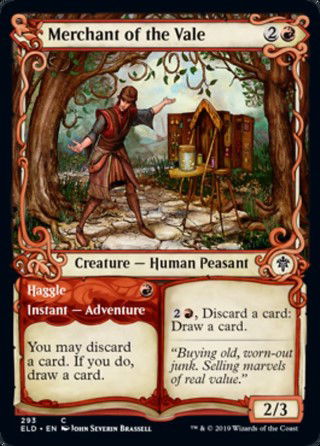 becomes much better in the mainboard with Clover when it means we're drawing 4 cards with Song down and we're getting to discard 2 to help fill the yard for Uro or even as a trick to put him in the yard (and yes, imo Haggle
becomes much better in the mainboard with Clover when it means we're drawing 4 cards with Song down and we're getting to discard 2 to help fill the yard for Uro or even as a trick to put him in the yard (and yes, imo Haggle would still be better than Opt
would still be better than Opt because it's much less narrow).
because it's much less narrow).
If this goes in the deck, my guess is it would be best suited for the sideboard. You can't really afford to play a turn 2 do-nothing card against Aggro, for example (which is unsurprisingly our most challenging match-up).
Latest Articles
Login to comment
2 comments
| 19 | 0 | 31 | 9 | 0 |
|---|---|---|---|---|
| 0 | 0 | 0 | 0 | 0 |
| Symbols | Percentage | Lands |
|---|

